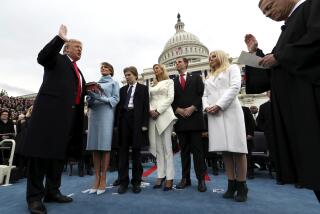Millions in His Pocket, Clinton Is Coming to a Store Near You
- Share via
Bill Clinton’s “My Life,” due out Tuesday, will almost certainly become the best-selling presidential autobiography ever published. Already, it’s the most lucrative from an author’s point of view: The former president received an advance, reported to be more than $10 million, that set a record not just for presidential memoirs but for all nonfiction books.
This is pretty remarkable for a president who left office in 2001 with dismal personal ratings; 67% of Americans found him “not honest or trustworthy” at the end of his term, an ABC News poll found. Republicans hated him; Democrats were deeply disappointed. His designated successor was defeated. Few wanted to hear from him; even candidates from his own party asked him not to come to town to campaign for them.
Given that, can Knopf’s bet possibly pay off? Can Clinton really sell the 1-million-plus copies needed to earn back the fattest nonfiction book advance ever -- more than was paid to GE’s Jack Welch ($7 million), to Clinton’s wife ($8 million) or to the pope ($8.5 million)?
I believe it can. First of all, the book appears in the midst of the greatest bull market for political books ever. Despite a longtime industry rule of thumb that political books do not sell, in one recent week this spring, nine of the top 10 titles on the New York Times nonfiction bestseller list were political in nature. Michael Moore, Ann Coulter, Bill O’Reilly, Bob Woodward and Joseph C. Wilson IV are among the authors whose books have become bestsellers in recent months.
Of course, presidential autobiographies are a distinct genre, and most have disappointed their publishers.
One of the reasons is that presidents don’t write memoirs; ex-presidents do. By the time Ronald Reagan published “An American Life,” for instance, George H.W. Bush had been in office for two years, and few readers felt compelled to look back. The same was true for Gerald Ford’s “A Time to Heal.” Richard Nixon did better. He overcame both disgrace and poor reviews when his 1978 memoir, “RN,” made the bestseller lists. But the best model is “Personal Memoirs,” the autobiography of Ulysses S. Grant. First published in 1885 by a firm controlled by Grant’s friend, Mark Twain, the two volumes were completed four days before Grant succumbed to throat cancer, and have been in print ever since. (Clinton kept both volumes in the Oval Office.) The book earned $500,000, or about $9.3 million in today’s dollars.
The inescapable, and not all that surprising, fact is that the autobiographies that sell best are those by the most controversial presidents. Clinton’s publishers know this and presumably received a promise that he would deliver the goods, from Monica to the final-hour presidential pardons.
Here are four more reasons Clinton’s book will earn out its advance:
* Richard Nixon once declared that “the worst thing a politician can be is dull.” Clinton revealed himself to be a flawed leader, playing equally well the role of hero and rogue. That duality makes him the most richly textured president since Nixon.
* While Clinton was still in office, a cottage industry of Clinton insider books climbed the bestseller lists. And it didn’t seem to matter if they were pro or con.
* More than 1.5 million copies of Hillary Clinton’s book were gobbled up, and readers, presumably, will turn out in droves for the other side of the story.
* This will be one of the most carefully orchestrated, painstakingly marketed rollouts in history. “60 Minutes,” Oprah, magazine covers, news nuggets. Book signings will look more like parades.
In the 3 1/2 years since he left office, Clinton has reinvented himself yet again. Voters -- and book buyers -- appear to have forgiven him his trespasses and are apparently prepared -- in this politically polarized election year -- to view him through a hazy, nostalgic memory of peace and prosperity.
Yet if Clinton is also hoping for critical success, he may be disappointed. A president’s legacy is often derived from a single ideological triumph. Lyndon Johnson passed the Civil Rights Act. Nixon went to China.
It may not be enough that Clinton delivered on the economic mandate that got him elected, presiding over the greatest peacetime expansion in recent history. Absent a clear, tangible legacy, Clinton’s troubles may define his presidency more than his accomplishments.
Jeffrey A. Krames is vice president and publisher of McGraw-Hill.
More to Read
Sign up for our Book Club newsletter
Get the latest news, events and more from the Los Angeles Times Book Club, and help us get L.A. reading and talking.
You may occasionally receive promotional content from the Los Angeles Times.







